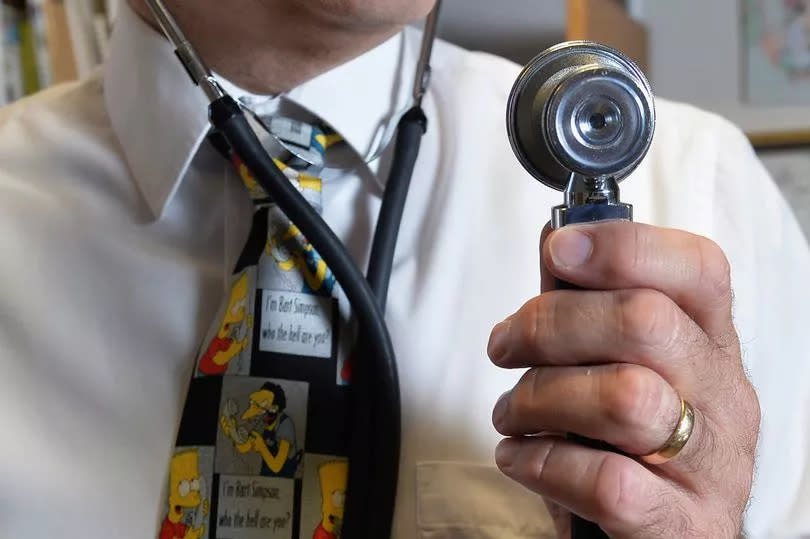Doctors finding themselves out of work with cash-strapped surgeries unable to employ them - report

Doctors across Teesside have found themselves out of work but surgeries cannot afford to take them on, councillors have heard.
Patients would both go to A&E when they struggled to see GPs, and come back to surgeries for support while waiting for delayed care further down the line, a new report says. It also tells of patients' frustrations as they called surgeries, and staff's stress as they bore the brunt of abuse.
Stockton Council has reviewed access to GPs and primary medical care, regarded as the NHS's "front door" including surgeries and pharmacies. Its adult social care and health select committee has heard from organisations including the Cleveland Local Medical Committee (LMC), an independent body which represents GPs and practice teams.
READ MORE: More than 90,000 polling cards have to be resent following printing mistake
READ MORE: Life expectancy in Stockton: 'No borough has a higher gap between the less well off and better off'
"Practices needed more staff but were prohibited from increasing their workforce due to financial restrictions," says the report, referring to the LMC's evidence. "Interestingly, Cleveland LMC stated that there were a number of GPs seeking work/additional work within Teesside who practices could not afford to employ due to financial restrictions."
In November last year the LMC knew of 16 GPs across Teesside who had been looking for work and were "unable to find any, or were available for additional shifts on top of their regular work". This was a described as "a national problem that was impacting in Tees" in the report which will go before Stockton Council's cabinet on Monday June 17.
The LMC said recruitment was more challenging in Teesside than other areas. The North East and North Cumbria Integrated Care Board also told of challenges finding and keeping staff, with practices giving "very high value for money" but not having enough income to cover wage increases.
The government released plans in May last year to make it easier for patients to see GPs and provide faster, more convenient care. The "recovery plan" aimed to support patients, reduce the numbers struggling to contact their practices, bring in and keep more doctors and cut bureaucracy.
Recovery plan 'would have limited impact'
But the LMC felt the national recovery plan "would have limited impact as it failed to address the underlying issues around funding and workload". The council's report said the "high-profile aim to tackle the '8am rush' did not translate verbatim into the existing GP contract, nor did it mean that an individual would get an appointment on the same day".
Practices were losing experienced staff and taking time to train new people to fill the void, with trainees preferring to work in larger cities. A significant loss of expertise was also "looming" as about 18% of GPs were over 55.
A clinical director and GP trainer spoke of the challenges of getting people with the right qualities into the region and said "the training scheme was not overly appealing/rewarding". High numbers of patients did not turn up to appointments, though some patients could not get through to surgeries to cancel them.
The committee found the legacy of covid put more demands on the health system, with a backlog of patients who often needed complex care, staffing problems, growing frustrations about longer call waiting times and more abuse of practice staff. People were frustrated about a lack of face-to-face appointments and a 2023 survey found "significant difficulties" for people trying to get through on the phone to "a good proportion of local practices".
'Seeking less stressful roles'
Patients often felt uncomfortable discussing health conditions over the phone while call handlers did not like having to ask them questions and found it hard managing patient demand. The report says reception staff were "seeking less stressful roles outside the sector" and concern was raised about nursing numbers.
The committee expressed "unease about the gloomy picture being portrayed" at one point, but noted improvements and innovation to make things more efficient and accessible and said patient groups felt they were listened to. Practices were said to be delivering more appointments than ever and all of Stockton's 21 general practices - which served between 2,300 and 21,500 people each - were deemed safe by the Care Quality Commission, which had rated 17 surgeries good and four outstanding.
National measures included a scheme which gave funding for 61 people to additional roles in Stockton, but the LMC said this had limitations as it could not be spent on core staff. And a three-year regional programme brought together the NHS, councils and voluntary and community groups to tackle inequalities and poor health, including steps to attract GPs in deprived areas and extra training and support to encourage trainee doctors.
The report concluded: "This review has shone yet another light on a sector which remains under significant strain, principally due to the twin pressures of sustained high-level demand and ongoing workforce challenges (which could get worse).
"The challenge remains to help the public understand who to contact and which services they should be trying to access depending on their presenting condition. Whether enough health staff are in place to meet that need is, however, a much more significant concern moving forward."
For breaking news in your area direct to your inbox every day, go here to sign up to our free newsletter

 Yahoo News
Yahoo News 
